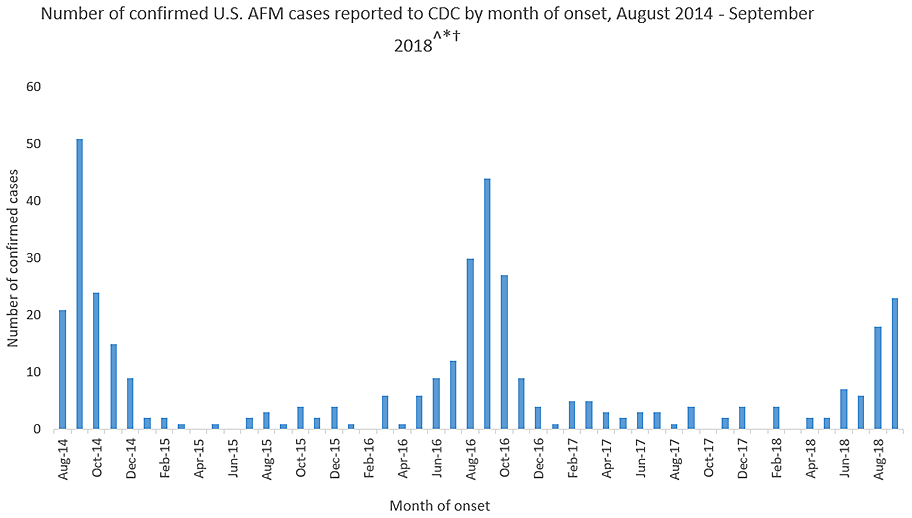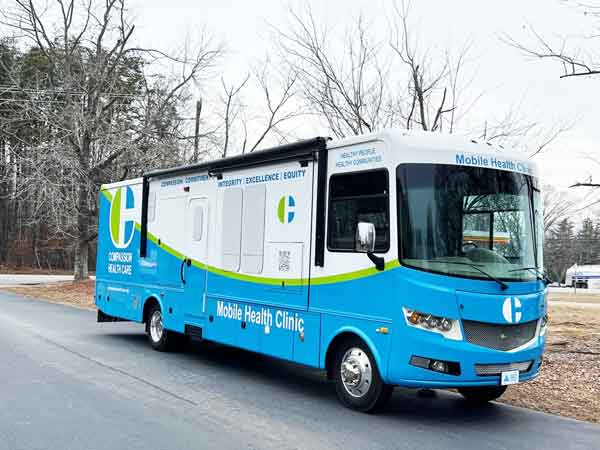Acute Flaccid Myelitis 2018
Acute Flaccid Myelitis (AFM) cases are increasing. The AFM cases have been reported in 22 states, including North Carolina (1 case). Reports as of October 24th, 2018 state that of these 62 cases, 58 (94%) are in children.
What is Acute Flaccid Myelitis?
AFM is a rare, but very serious condition that can lead to serious neurologic problems. The CDC estimates that less than one in a million people in the U.S. will get AFM every year. It is not yet known how most people get this condition, nor is it known how to protect against it right now.
The spinal cord (or gray matter) is affected by AFM causing the muscles to become weak, as well as the person’s reflexes.
AFM can often be difficult to diagnose because the symptoms resemble other neurological diseases like Guillain-Barre Syndrome (GBS), Acute Disseminated Encephalomyelitis (ADEM), and Transverse Myelitis.

What are the symptoms of Acute Flaccid Myelitis?
AFM is typically characterized by a sudden onset of weakness and loss of muscle tone and reflexes in the arms and/or legs.
Serious AFM symptoms include:
- Unable to walk or move
- Difficulty breathing
- Unable to grasp items (dropping items)
- Slurred speech
- Difficulty moving the eyes
- Facial drooping
- Drooping eyelids
How is AFM Diagnosed?
Acute Flaccid Myelitis, while difficult to diagnose, usually includes an MRI of the spine, cerebral spinal fluid (CSF) testing, a physical exam, and a nerve conduction velocity (NCV) test. An electromyography (EMG) may also be done.
What causes Acute Flaccid Myelitis?
The possible causes of AFM have not been linked to one single thing, despite extensive lab tests. However, there are viruses that have been known to cause this condition which are:
- Poliovirus
- Non-Polio Enteroviruses
- West Nile Virus (WNV)
- Japanese Encephalitis
- Saint Louis Encephalitis
- Adenoviruses
While these viruses may lead to AFM, it’s still not known how it is triggered by them. It is puzzling how some people develop AFM after an infection, but others do not.
What are the treatments for Acute Flaccid Myelitis?
While there is no evidence that any of these affect recovery, treatments for AFM include:
- Immunoglobulin
- Corticosteroids
- Plasma Exchange
- Antiviral Therapy
- Physical Therapy
- Occupational Therapy
While some people have made a complete recovery, most people affected by AFM have experienced continued muscle weakness. Because this is fairly new, long term outcomes are still not known.
How can I prevent Acute Flaccid Myelitis?
Right now there are no known preventions or treatments for the condition. However, since Polio and WNV may lead to AFM, the CDC recommends staying up-to-date on your vaccinations. Help protect yourself against Poliovirus by getting the proper vaccination.
Bites from mosquitos can carry West Nile Virus. Be sure to spray repellent when going outside when mosquitos are known to be present.
Another suggestion, while it is not known to be effective, is washing your hands often with soap and water. Even though we aren’t positive that this will prevent the condition, it has been proven as a way to prevent getting sick and reducing the spread of germs from person to person.

